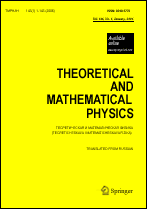|
This article is cited in 20 scientific papers (total in 20 papers)
Wave-packet continuum discretization method for solving the three-body
scattering problem
V. I. Kukulin, V. N. Pomerantsev, O. A. Rubtsova
Skobeltsyn Institute of Nuclear Physics, Lomonosov Moscow State University
Abstract:
We generalize the wave-packet continuum discretization method previously
developed for the scattering problem to the three-body system. For each
asymptotic channel, we construct a basis of three-body wave packets
given by square-integrable functions. We show that the projections of
the channel resolvents on the subspace of three-body wave packets are
determined by diagonal matrices, whose eigenvalues we find explicitly. We
express the amplitudes of $2\to 2$ processes explicitly in terms of
"wave-packet" finite-dimensional projections of the full resolvent. To illustrate
our formalism, we calculate the differential cross section of elastic
deuteron scattering on a heavy nucleus above the three-body breakup
threshold and the $s$-wave quartet $(n-d)$-scattering amplitude.
The results of the calculations agree well with the results obtained by other
methods. In terms of complexity, the proposed scheme for solving
the three-body scattering problem is comparable to solving a similar problem
for bound states.
Keywords:
quantum scattering theory, few-body system, discretization of the continuum.
Received: 22.04.2005
Revised: 19.05.2006
Citation:
V. I. Kukulin, V. N. Pomerantsev, O. A. Rubtsova, “Wave-packet continuum discretization method for solving the three-body
scattering problem”, TMF, 150:3 (2007), 473–497; Theoret. and Math. Phys., 150:3 (2007), 403–424
Linking options:
https://www.mathnet.ru/eng/tmf5991https://doi.org/10.4213/tmf5991 https://www.mathnet.ru/eng/tmf/v150/i3/p473
|


| Statistics & downloads: |
| Abstract page: | 509 | | Full-text PDF : | 272 | | References: | 89 | | First page: | 1 |
|




 Contact us:
Contact us: Terms of Use
Terms of Use
 Registration to the website
Registration to the website Logotypes
Logotypes









 Citation in format
Citation in format 
